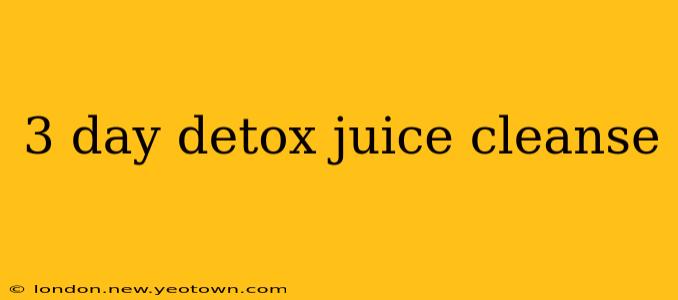Are you feeling sluggish, bloated, or just in need of a fresh start? A 3-day detox juice cleanse might be just what you need to reset your system and feel revitalized. But before you jump in, let's explore what a juice cleanse entails, the potential benefits, and importantly, the things you should know before embarking on this journey. This isn't a magic bullet, but a supportive step towards a healthier lifestyle. Think of it as a mini-vacation for your digestive system.
What is a 3-Day Detox Juice Cleanse?
A 3-day detox juice cleanse involves replacing solid foods with fresh, cold-pressed juices for three consecutive days. These juices are typically packed with fruits and vegetables, providing a concentrated dose of vitamins, minerals, and antioxidants. The idea behind a juice cleanse is to give your digestive system a break from processing solid foods, allowing it to focus on eliminating toxins and promoting overall wellness. It's a temporary dietary shift, not a long-term solution. Remember, your body is amazing at detoxifying itself naturally! This cleanse supports that process.
What are the Potential Benefits of a 3-Day Detox Juice Cleanse?
Many people report feeling lighter, more energetic, and experiencing improved digestion after a juice cleanse. The high nutrient content in the juices can provide a boost of vitamins and minerals, contributing to better skin, improved mood, and increased energy levels. However, it's important to remember that these benefits are often temporary and depend on several factors, including your overall health and diet.
Will a 3-Day Juice Cleanse Help Me Lose Weight?
While some people may experience temporary weight loss due to fluid loss and reduced calorie intake during a juice cleanse, it's not a sustainable or healthy method for long-term weight management. The weight lost is often regained quickly once you return to your normal diet. Focusing on a balanced diet and regular exercise is a much more effective approach to weight loss.
What are the Potential Side Effects of a 3-Day Detox Juice Cleanse?
While generally considered safe for healthy individuals, juice cleanses can cause some side effects, particularly if you have pre-existing health conditions. Some common side effects include headaches, fatigue, dizziness, and irritability. These are often due to the sudden change in diet and the lack of certain nutrients. It’s crucial to listen to your body and stop the cleanse if you experience any significant discomfort.
Is a 3-Day Juice Cleanse Right for Everyone?
No, a 3-day juice cleanse is not suitable for everyone. People with certain health conditions, such as diabetes, kidney disease, or eating disorders, should avoid juice cleanses. Pregnant or breastfeeding women should also consult their doctor before attempting a cleanse. It's always advisable to consult your doctor or a registered dietitian before starting any detox program, particularly if you have any underlying health concerns.
What Should I Expect During a 3-Day Juice Cleanse?
Expect to feel a shift in energy levels. You might experience a period of adjustment as your body adapts to the change in diet. Staying hydrated is crucial, so drink plenty of water alongside your juices. Listen to your body and rest when needed. You might also experience some detoxification symptoms, such as headaches or mild nausea, but these should subside as your body adjusts. Remember, this is temporary!
What Should I Do After a 3-Day Juice Cleanse?
Gradually reintroduce solid foods into your diet after the cleanse. Start with light, easily digestible foods like soups, fruits, and vegetables, and slowly increase your intake over a few days. Continuing a healthy eating pattern is key to maintaining the benefits you've experienced.
In conclusion, a 3-day detox juice cleanse can be a beneficial way to temporarily reset your digestive system and boost nutrient intake. However, it's not a miracle cure or a sustainable weight-loss solution. Always listen to your body, prioritize your health, and consult a healthcare professional before starting any significant dietary change. Remember, long-term health is built on sustainable, balanced habits.

